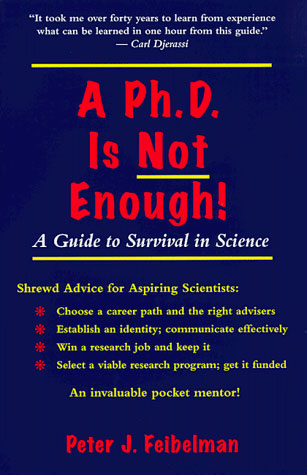A PhD Is Not Enough: A Guide To Survival In Science (Book Review)
 Deciding to undertake the Ph.D. route is difficult enough but once the choice has been made, developing the essential survival skills will make the difference between succeeding or failing: it's that plain and simple!
Deciding to undertake the Ph.D. route is difficult enough but once the choice has been made, developing the essential survival skills will make the difference between succeeding or failing: it's that plain and simple!
One of the books that helped me in my decision was "A Ph.D. Is Not Enough" by Peter J. Feibelman. Although, the title might have been chosen for shock value and/or marketing purposes, it's pretty self-explanatory. In the words of the author, "this book is meant for those who will not be lucky enough to find a mentor early" and hopefully "this pocket mentor will help you to become more introspective about what it will take to succeed". The author also adds that the key to success is to emerge from the Ph.D. with not just technical skills but an understanding on how to survive in science. The book is a quick and easy read (only 105 pages). Feibelman divides it in 8 chapters, each one can be considered a standalone concept and therefore need not be read in sequence, but most importantly the format is ideal for frequent refreshes and consultations. In chapter 1, he presents 6 real-life stories and examples, one of which his own. These 6 'case studies' - if you will - are scenarios in which Ph.D. students or Post-Docs may find themselves in. All six stories have a common theme: understanding the reality of life in the sciences is as important as being smart. Chapter 2 was my favorite. It deals with choosing a lab or a supervisor. Feibelman offers conventional guidelines to help you make that decision, but he also wants you to learn from his mistakes; therefore, he tells you that if the supervisor's students cannot explain to you "the big picture", then change supervisor (he explains why in the book). Chapter 3 covers oral presentations: your brilliant discoveries are meaningless if they are not delivered well. And chapter 4 deals with writing papers and how to "publish without perishing". Chapter 5 has some insightful comparison between jobs in academia, industry and government labs (for more on this topic you can read here the posts by our CaleD!). Finally, the remaining three chapters discuss topics more relevant to the post-doc and young scientists (so I'll spare you the description).
Ultimately, although I can't assess where this book places in the literature of its subject, I found it extremely entertaining and insightful. I liked its bluntness on several aspects of academia; plus the real-life characters in the book will remind you of yourself or other people in your lab: I would be surprised if you walked away from this book without learning something. If I have to find a weakness in this book I would have to say that is now a bit dated (1993!) and heavy on the academia path. Other books that were recommended to me on the topic: Playing the Game: The Streetsmart Guide to Graduate School by Frank, C. Karl Stein and Getting What You Came For by Robert Peters.
Here are some of the top recommendations I wrote for myself while reading A PhD Is Not Enough:
1. To succeed one needs to make a cold blooded analysis of his/her capabilities 2. As a student you will need to teach yourself how to be problem-oriented rather than technique oriented. 3. Research projects must address the scientific issue regardless of the technique 4. You can’t learn all the techniques so take on collaborators or help from peers 5. Focus on a long-term plan and plan it as a series of short-term projects (each project should yield an abstract and then a paper) 6. Keep producing 7. Work on more than one project at a time (project A and project B) 8. Always remember what you want to learn and where you want to go 9. Ambition is rewarded in scientific life, lack of ideas not. 10. Keep up your requests for support to show that you are scientifically alive 11. Find a mentor!